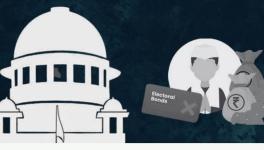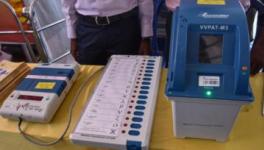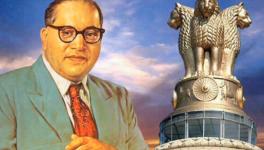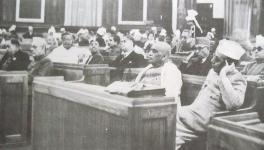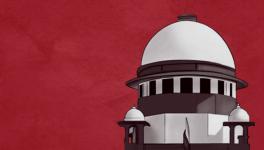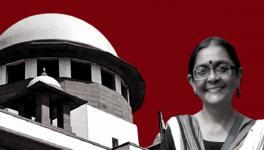Justice Chandrachud's statement on Gyanvapi is in contempt of his Ayodhya judgement: Justice Kolse Patil
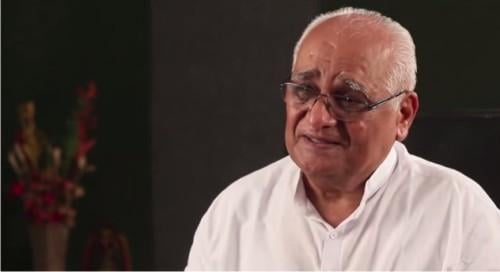
Image Courtesy: Sabrang India
Former Judge BG Kolse Patil was born in an unimaginably poor family, which shared its thatched hut with goats and poultry they raised. He worked and studied and became a judge of the Bombay High Court. In 1990, as the right-wing communal forces gathered momentum and became increasingly reckless in pursuing a destructive brand of politics, Patil resigned from the Bombay High Court. He thought he would serve India better through social activism than the judiciary. Inspired by the ideology of Jyotirao Phule, Shahu Maharaj and Dr BR Ambedkar, he has consistently sided with oppressed castes in their fight against marginalisation—and for justice. His public meetings draw massive crowds.
NewsClick caught up with him while he is in Delhi for a few days and quizzed him on the Supreme Court’s controversial order on Varanasi’s Gyanvapi Mosque, which has given a fillip to divisive politics. Excerpts:
What is your assessment of the Supreme Court’s order on the Gyanvapi mosque in Varanasi?
The demolition of the Babri Masjid, in December 1992, encouraged the communal forces—and imbibed in them the belief that they could flout the country’s laws with impunity. Even during the Ram Janmabhoomi movement, they had a slogan: “Ayodhya to sirf jhaanki hai, Kashi-Mathura baaqi hai (Ayodhya is a mere teaser, Kashi and Mathura are still left.)” They would claim that there was a long list of mosques built after demolishing temples. The demolition inaugurated a type of politics that could only devastate the country. Our focus should be on providing food, house, clothing, healthcare and education to the poor.
I respect the judiciary as I did my parents. Without the judiciary, there is no hope for us, no option. If the judiciary had been firm and strong, then the country would not have been in such a deplorable state. I have said many a times that the judiciary delivers judgement, not justice.
Are you suggesting that justice was not delivered by the Supreme Court’s Gyanvapi order?
The Supreme Court order did not state it in writing, but what Justice DY Chandrachud said in the court—that the Places of Worship (Special Provisions) Act, 1991 does not debar ascertainment of the religious character of a place of worship—has sent a message right across India that what is said to be a fountain in the Gyanvapi mosque is actually a shivling.
Second, the findings of the commission appointed to survey the Gyanvapi complex were leaked. Look at the irony—the judicial proceedings, whether in lower courts or the Supreme Court, have ejected the judiciary from the manufactured dispute over the Gyanvapi mosque. By this, I mean that the dispute has been transferred to the people’s court. The matter no longer remains with the judiciary.
Are you suggesting that the Supreme Court was wrong in passing the order that it did on the Gyanvapi mosque?
Absolutely, it was downright wrong of the Supreme Court to pass the order it did. Justice Chandrachud may not have intended to do so, but his statement regarding ascertainment has indeed sent the message that Hindu communal elements can lay claims to any mosque, that they are legally right in doing so. This is in contradiction to what the five-member bench said in the Ayodhya judgement of November 2019. And mind you, Justice Chandrachud was one of the five members.
The 2019 Ayodhya judgement said secularism is one of basic features of the Constitution, that the Places of Worship Act upholds the principle of secularism, and that our Constitution recognises non-retrogression—that is, a right once granted cannot be taken away or diminished.
Justice Chandrachud’s statement regarding ascertainment is not only wrong; his statement is also in contempt of his 2019 Ayodhya judgement.
Let me re-state what you said: Justice Chandrachud’s statement on ascertainment is in contempt of the 2019 Ayodhya judgement. Am I right?
(Laughs) Yes, he is in contempt of his own verdict, even though he may say he was merely interpreting the 1991 Act. I do say the judiciary is like our parents. But you have to speak out against it when a wrong is committed. When the 2019 judgement was delivered, I had gone on the TV to say that the disputed place in Ayodhya should have kept for building a national monument. The disputed place should have been awarded neither to Hindus nor to Muslims. I said this on the TV because I had believed the Supreme Court would do that.
But to whom did the Supreme Court give the disputed place in Ayodhya? It gave it those who were in contempt of the Court, who violated laws, who riddled the Constitution with holes and tore it into bits. And to think the first entry of Article 51A states: “It shall be the duty of every citizen of India—to abide by the Constitution and respect its ideals and institutions, the National Flag and the National Anthem.”
Really, whom do you deliver justice? You do so to one who comes to the court with clean hands. Those who were demanding justice on Ayodhya from the Supreme Court had come to it after being involved in many unseemly actions. They were, anyway, guilty of contempt of court.
You say contempt because the Supreme Court, in 1992, had allowed only a symbolic puja, but the kar sevaks, brought there by the Rashtriya Swayamsevak Sangh, went ahead and demolished the Babri Masjid?
You are right, absolutely. In fact, Atal Bihari Vajpayee was the first one to commit contempt. I remember that on 5 December 1992, he said the Supreme Court had allowed us to do symbolic puja, but, in the same breath, he said a puja could not be performed at a place where there are rocks and stones and the domes of the masjid. He was dropping hints to the people that the land had to be levelled and the structures there removed.
Anyway, the Supreme Court never took all these aspects into account. The Supreme Court, in 2019, said that it could not decide where Ram was born; it said there is no evidence that a Hindu structure was destroyed to build the Babri Masjid, which, mind you, had been there for over four centuries. Yet the Babri Masjid site was handed over to Hindus.
Buddhists claim the Babri Masjid had been originally the site of their place of worship. They also say their stupas and monastries were destroyed and….
Dr Ambedkar says India’s history is largely the history of a mortal struggle between Buddhism and Brahminism—and that Buddhist places of worship were destroyed to build Hindu temples. But, above all, Muslims did not come here to turn India Muslim. If that had been the case, then Hindus would not have been 80% today. They came here to rule. Under the Mughals India was a superpower, to use the term touted these days. Our GDP was the highest. Why are we fighting the Muslims?
Why don’t you answer that question?
To answer that question, the Sangh’s ideology has to be decoded. When you read their ideological icons—Tilak, Savarkar and Golwalkar—you will understand the thinking of reactionary Brahmins. They feel they are the country’s owners. The rest of us are just good to have two meals a day.
Where does the Gyanvapi mosque controversy fit into this framework?
I will say, the judiciary can do nothing. The Supreme Court order has indirectly incited the feelings of the people.
You mean to say that Justice Chandrachud’s statement has instigated the Hindus, encouraged them to stake claims?
He may not have thought while speaking in an open court, but the people have already drawn an inference there was a temple of Mahadev where the Gyanvapi mosque is. Regardless of the Supreme Court order, the people have drawn their own conclusion. Now that this has happened, it does not take much for political parties to incite them.
RSS chief Mohan Bhagwat says there is no need to look for a shivling in every mosque.
(Laughs) The Sangh has always engaged in doublespeak. They speak in forked tongues. They are masters of double standards. Who has laid the foundation for disputes over places of worship in India? The answer is: RSS.
What happened to the Supreme Court that it chose to ignore the unambiguous stipulations of the Places of Worship Act?
Who can tell what lies in the hearts of Supreme Court judges? On the very first day the Gyanvapi mosque came up, the Supreme Court should have said, The Places of Worship is there, so stop all this nonsense. The Indian judiciary has powers that make it the most powerful judiciary in the world. India’s wellbeing is assured as long as the Indian judiciary remains firm and strong. Alas, this does not often happen.
Why?
When a chief justice becomes a me-too accused, when four senior judges held a press conference in 2018 and alleged outside interference, then the suspicion that outside powers dictate terms to the Supreme Court seems to have a grain a truth. At the time the judges held the press conference, I had then said that if the Chief Justice had even an iota of shame, he should resign.
Second, we have failed to educate the people of India. Who are Muslims? The blood of Hindus and that of Muslims are the same. Even Swami Vivekananda said that. I would say our blood and that of Pakistanis are the same. This is the truth, which should have been upheld by the Supreme Court. Obviously, politicians will never do that. It was the duty of the Supreme Court to stop this politics over places of worship.
You think it was the duty of the Supreme Court to stop the politics over the Gyanvapi mosque?
Yes. The Pandora’s Box that was opened in 2019 should have been shut in 2022. Mind you, I am not against anyone, not against the judiciary, not against Brahmins, as is alleged. I am for humanity, for the good of India. And the good of India has not been served by the Supreme Court’s Gyanvapi order.
(Ajaz Ashraf is an independent journalist.)
Get the latest reports & analysis with people's perspective on Protests, movements & deep analytical videos, discussions of the current affairs in your Telegram app. Subscribe to NewsClick's Telegram channel & get Real-Time updates on stories, as they get published on our website.









